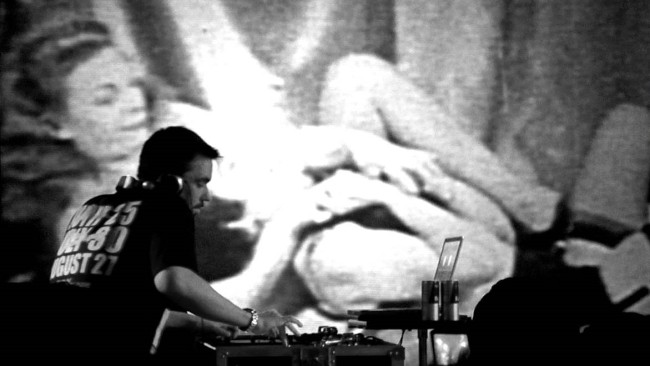

Kevin Kerslake’s latest film, As I AM: The Life and Times of DJ AM, is a 97-minute feature documentary profiling the success and tumultuous life of one of music’s most talented-yet-complicated DJs and remixers. The movie maker’s current effort premiered on opening night of this year’s Tribeca Film Festival.
The groundbreaking music video and commercial director brought together a slew of home movies, photo albums, offbeat montages and memorable performances to capture DJ AM’s legacy. Interviews from Mark Ronson, Red Foo, A-Trak, Paul Oakenfold, Jazzy Jeff, Diplo, Jon Favreau, Steve Aoki, Z-Trip and Clark Kent among others rounded out Kerslake’s riveting tribute film.
Throughout As I AM, the filmmaker who studied at Loyola Marymount re-purposed an echoing, self-deprecating speech DJ AM delivered during a recovery meeting as the narration of his life story. The entertainer’s vivid anecdotes uncover his brutal honesty about the difficulty in fully accepting who he was but selflessly dedicating himself to helping other recovering addicts.
“It’s a complex movie with a lot of different parts,” says Kerslake often taking pauses over the phone. “I just try to get into the soul and pass the surface. With AM, his life offered an incredible amount of travel into many different corners of pop culture and his personal psyche.”
Before DJ AM’s life ended tragically from a drug overdose in 2009 at age 36 back when Narcan wasn’t as popular as it is today, the Philadelphia native born Adam Goldstein was in his element when it came to playing music. The former member of the chart-topping rock-rap act Crazy Town pioneered and popularized “mash-ups,” or extended mixes that link together words and melodies from various genres of music, pre-Serato on the club circuit.
The sought after DJ’s party rocking style led to him becoming Vegas’ first resident DJ to negotiate an unprecedented million-dollar contract. Celebrities like Madonna, Tom Cruise, Usher, Jay Z, J.Lo and Christina Aguilera often booked the sneakerhead to spin at their parties. It seemed like DJ AM was on top of the world.
Despite having success, DJ AM’s entire life was haunted by an addiction to crack cocaine, physical abuse, anxiety, trauma from his parents’ divorce, low self-esteem and life-threatening post-traumatic stress resulting from a 2008 near fatal plane crash with drummer Travis Barker.
Kerslake felt it was necessary to dedicate his high energy 2011 concert film, Electric Daisy Carnival Experience, to DJ AM, who appeared in the film just before his passing. Armed with 50 terabytes of footage after two-and-a-half years, it was extremely important to Kerslake, still periodically pausing between statements, to not translate tunnel vision about DJ AM’s life into the final product.
“When you have to translate that into film,” says Kerslake, “it’s easy to get lured into one aspect of his life. The task that Joel [Marcus], my editor, and I had was to fuse all of those things together and have as much of that naturalism that we could have on his life.”
Kerslake was completely authorized by DJ AM’s estate to bring his story to the big screen. The highly creative director bonded especially with DJ AM’s mother. She frequently appears throughout As I AM.
“They came to trust me to tell AM’s story in a way that embraced everything about him, honored his legacy and to be honest about the darker undercurrents that he was subject to,” says Kerslake.
There was no specific agenda for creating As I AM. Kerslake intentionally avoided using one style of camera angles or editing techniques synonymous with many of his filmmaking contemporaries. “I was so promiscuous with styles,” adds Kerslake.
“I fought that instinct to brand myself like that. You’re always in for surprise, so being open to the possibilities they can afford you is super important. Have the patience and the openness to let things happen and to not force the issue. When you’re doing a film, the relentless push to find new material is a big endeavor.”
Kerslake sums up filmmaking as a combination of connecting with the subject, discovering a distinct style of storytelling and having the mojo to complete the task. Though he never officially met DJ AM, he describes making As I AM as “insane fun with a lot of sleepless nights.”
Now the film is complete, Kerslake identifies with DJ AM’s unwavering love for music. “Film is to me what music was to him,” says Kerslake, sharing that he was a musician prior to filmmaking. “Having that daily and even minute-by-minute connection to your passion is a privilege to be able to immerse yourself in as fully as he did.”
The proceeds from As I AM are going towards the DJ AM Memorial Fund funneled directly through MusiCares, DJ AM was actively supported. The funds will go towards those in recovery, battling dependency and experiencing post-traumatic stress disorder.
It’s difficult for Kerslake to have an objective for audiences that will see As I AM. One thing he would like for viewers to come away with is having empathy for others despite their own personal struggles.
“Because AM’s work in that regard was really one of the most important things in his life,” says Kerslake, “it was paramount to extend that legacy forward. If anything goes to raise awareness about the plight of certain people, then the world is a better place. It’s a matter of being appreciative of what people are going through and having compassion for them even when you’re suffering yourself. That’s the core of why I made the movie.”
This post was written by Christopher A. Daniel, pop cultural critic and music editor for the BurtonWire. He is also contributing writer for Urban Lux Magazine and Blues & Soul Magazine. Follow Christopher @Journalistorian on Twitter.
Follow the Burton Wire on Twitter @TheBurtonWire or Instagram.








